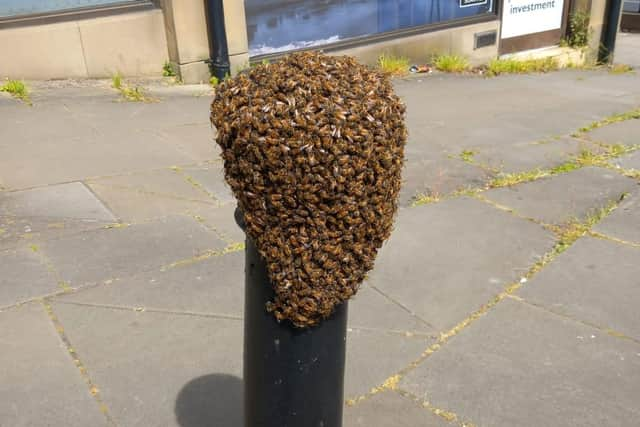Swarm of bees rescued from Lancaster city centre street
and live on Freeview channel 276
The bees were spotted in Church Street, close to Mitre House and the Judge's Lodgings, on Tuesday, and Lancaster Beekeepers were called to the scene to assist with their removal.
Jim Anderton, social media representative for Lancaster Beekeepers, said: "Swarming is a natural occurrence of bees.
Advertisement
Hide AdAdvertisement
Hide Ad"There can be several factors involved. The most common is that the colony gets too big and the queen decides to leave with a large number of the colony.


"Just before they leave the worker bees gorge on honey to ensure they have enough food to last the journey, and the queen will also slow down laying eggs and slim down a bit so she is light enough to fly.
"The remainder of the colony will stay and potentially produce a new queen.
"Swarming of bees can start with a handful of scout bees checking out potential new locations to live, and once one is found the swarm will leave the hive with the queen and head towards to new location guided by the scout bees.
"Swarms can be as big as 20,000 bees or even bigger."
Advertisement
Hide AdAdvertisement
Hide Ad

The bees on the Church Street bollard were probably resting after leaving their hive, trying to gather strength to move on, Jim added.
It took the team from Lancaster Beekeepers around an hour to safely remove the swarm, and they were then taken to a quarantine site where they will be allowed to become a bigger colony and eventually put into a full-size bee hive and rehomed to a beekeeper’s apiary.
If a member of the public spots a swarm, the group’s swarm co-ordinator can be reached online at https://lancaster-beekeepers.org.uk/
If people are interested in taking up beekeeping as a hobby they can contact the club secretary via the website and register their interest in taking part in the 2024 beekeeping course.
Advertisement
Hide AdAdvertisement
Hide AdLancaster Beekeepers Club is a friendly group of hobbyist beekeepers who meet regularly throughout the year to share their experiences and develop their beekeeping skills.
The Lancashire and North West Beekeepers Association was founded in 1889, with the Lancaster branch following in 1942.